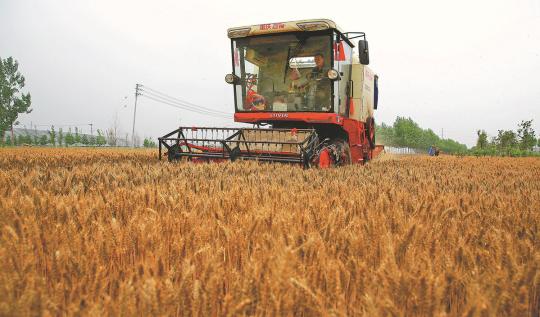
A harvester reaps wheat in a field in Qiliqiao village, Zhoukou, Henan province, on Monday during a break in the rain. (JIN YUEQUAN/FOR CHINA DAILY) Henan province, a major wheat production base in China, is taking all-around measures — including draining water out of fields, dispatching harvesters and accelerating the drying of grains — to offset the effects brought by recent rainfall that has affected the wheat at its ripening stage. The rain, which began in the middle of last week in southern Henan and lasted six days, has caused some of the crops to fall and some wheat to sprout, videos posted on social media show. The wet weather was the worst to occur during the wheat ripening period in 10 years, the Henan Provincial Department of Agriculture and Rural Affairs was quoted as saying by China Central Television. It affected all 17 cities in the province, especially the southern cities of Zhumadian and Nanyang, the department said. Besides affecting the wheat harvest progress in southern Henan, the rainfall has also affected crops in the northern and central areas of the province, where grains could fall in weight and quality, according to Guo Tiancai, a professor at Henan Agricultural University who was quoted by China Central Television. Guo said some plots in southern Henan have seen grains sprouting, which is causing concern because sprouting grains lead to declines in production and lower prices. The Henan provincial government has allocated 200 million yuan ($28 million) to help farmers dry the wheat. Local governments of the affected areas will also help speed up the wheat harvest by facilitating the transportation of harvesters and drying equipment to farms, local media reported. This year, Henan has over 5.67 million hectares of farmland growing winter wheat. The harvest is scheduled to end by the middle of this month, said the Henan Provincial Department of Agriculture and Rural Affairs. Of the wheat fields, around 266,660 hectares are set aside for wheat seeds, which make up 38 percent of seed production in the country. About 60 percent of seed production comes from northern Henan, where the wheat was less affected by the rainfall, but seed production in the southern part will be affected to some extent, said the department. The rainfall has raised concerns over the price of grain. Wheat that sprouted will have a low price, but the price will rise for wheat harvested later in areas such as northern Henan, and Shandong and Hebei provinces, said Cao Hui, director of the Industrial Development Research Office of the Rural Economic Research Center of the Ministry of Agriculture and Rural Affairs. "The losses caused by the rainfall in Henan are localized and will not greatly affect the overall situation, but the full impact still needs further observation," said Hu Bingchuan, a researcher at the Institute of Rural Development of the Chinese Academy of Social Sciences. China has long implemented a "minimum purchase price" policy for rice and wheat to ensure that farmers who produce these crops receive a certain level of income. |
Powered by Discuz! X3.4
© 2001-2013 Comsenz Inc.